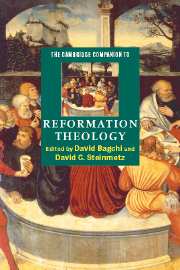Book contents
- Frontmatter
- Introduction
- 1 Late medieval theology
- 2 Lollardy
- 3 Hussite theology and the law of God
- 4 The theology of Erasmus
- 5 Luther
- 6 Melanchthon
- 7 Confessional Lutheran theology
- 8 The theology of Zwingli
- 9 Bucer
- 10 The theology of John Calvin
- 11 John Calvin and later Calvinism
- 12 The theology of Thomas Cranmer
- 13 The theology of the English reformers
- 14 The Scottish Reformation
- 15 An introduction to Anabaptist theology
- 16 Catholic theologians of the Reformation period before Trent
- 17 The Council of Trent
- Conclusion
- Select bibliography
- Index
- Series list
4 - The theology of Erasmus
Published online by Cambridge University Press: 28 May 2006
- Frontmatter
- Introduction
- 1 Late medieval theology
- 2 Lollardy
- 3 Hussite theology and the law of God
- 4 The theology of Erasmus
- 5 Luther
- 6 Melanchthon
- 7 Confessional Lutheran theology
- 8 The theology of Zwingli
- 9 Bucer
- 10 The theology of John Calvin
- 11 John Calvin and later Calvinism
- 12 The theology of Thomas Cranmer
- 13 The theology of the English reformers
- 14 The Scottish Reformation
- 15 An introduction to Anabaptist theology
- 16 Catholic theologians of the Reformation period before Trent
- 17 The Council of Trent
- Conclusion
- Select bibliography
- Index
- Series list
Summary
In Erasmus' time, Catholic critics circulated the tag, 'Erasmus laid the egg, and Luther hatched it.' The idea that Erasmus was a 'pre-reformer' and that his theology is best studied in the context of Luther’s thought has been perpetuated by modern historians. Protestant theologians, of course, capitalized on the doctrinal differences between the two men rather than on their common ground. This approach prompted Ernst-Wilhelm Kohls to accuse them of using Erasmus as a 'dark foil against which their own hero could shine more brightly'. Alternatively, Erasmus' religious thought has been viewed in the context of Christian humanism, which seems to me a more productive way of examining his theology. In either case, however, Erasmus' lack of a systematic approach has raised serious questions for the would-be interpreter and has led some historians to deny him the title of theologian altogether. Any investigation of his theological concepts must therefore begin with the subject of Erasmus' own claim to the title and the testimony of his contemporaries on that point. Although Erasmus’ professional status may be in doubt, it cannot be disputed that he engaged in activities that come within the purview of a theologian. He formulated a curriculum for theology students; he edited, translated, paraphrased, and expounded biblical and patristic texts; he commented on doctrinal questions; and he offered spiritual advice in devotional tracts. From these writings emerge the main points and general features of his religious thought.
Information
- Type
- Chapter
- Information
- The Cambridge Companion to Reformation Theology , pp. 28 - 38Publisher: Cambridge University PressPrint publication year: 2004
Accessibility standard: Unknown
- 4
- Cited by
